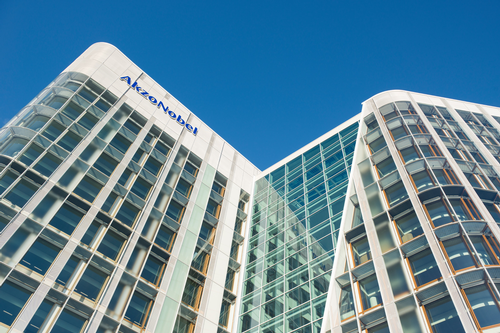THURSDAY, NOVEMBER 30, 2023
On Wednesday (Nov. 29), global coatings company AkzoNobel and Kansai Paint announced they have mutually agreed not to proceed with the AkzoNobel's intended acquisition of Kansai's paints and coatings activities in Africa.
“It's disappointing that this intended acquisition cannot move forward, but we remain committed to our strong businesses and leading brands in Africa,” commented AkzoNobel CEO Greg Poux-Guillaume.
“As AkzoNobel’s performance rebound gathers pace, we'll remain focused on our key priorities, including the strengthening of our balance sheet, which will be accelerated.”
According to the emailed press release, the two companies have also agreed that no break-up fee will be involved.
About the Proposed Merger, Initial Denial
In June 2022, AkzoNobel announced that it had reached an agreement with Kansai Paint to acquire its paints and coatings activities in the region.
Present in 12 countries in Africa, Kansai Paint has regional consolidated revenue of around 280 million euros ($300.8 million). Alongside AkzoNobel’s existing Dulux brand, the two are reported to be the longest-established paint brands in the region.

 |
| AkzoNobel |
|
On Wednesday (Nov. 29), global coatings company AkzoNobel and Kansai Paint announced they have mutually agreed not to proceed with the AkzoNobel's intended acquisition of Kansai's paints and coatings activities in Africa. |
According to AkzoNobel, the transaction would include the Plascon brand—which has more than 100 years of heritage in South Africa—in addition to various automotive, protective, coil and wood coatings.
Completion, which was subject to regulatory approvals, was expected sometime in 2023.
Then, in November of last year, the Competition Commission denied the proposed merger to acquire Kansai’s paint and coatings activities in the region. In South Africa, it is known that AkzoNobel controls the Akzo Nobel Powder Coatings South Africa; Akzo Nobel South Africa Ltd; ICI Dulux Ltd; and P J A Ltd. In addition, AkzoNobel manufactures Dulux-branded paint products which are used in various segments, primarily divided into decorative and industrial coatings.
The Competition Commission is a statutory body constituted in terms of the Competition Act, No. 89 of 1998 by the Government of South Africa empowered to investigate, control and evaluate restrictive business practices, abuse of dominant positions and mergers in order to achieve equity and efficiency in the South African economy.
As the manufacturer of these coatings, AkzoNobel is reported to have three manufacturing plants in South Africa alone—two located in Gauteng (in Alberton and Vanderbijlpark) and one, its largest, in Kwa Zulu Natal (in Umbogintwini). Products manufactured in these plants are sold within the country and are also reportedly exported to other countries in Africa.
Kansai Plascon Africa Ltd and Kansai Plascon East Africa Ltd are controlled by Kansai Paint Co. Limited and are noted to operate under the law of the Republic of South Africa and the laws of Mauritius, respectfully. In South Africa, both firms operate through Kansai Plascon Africa Ltd which manufactures Plascon-branded decorative coatings and industrial coatings.
According to reports, decorative coatings contribute the largest portion to net sales within Kansai Plascon Africa Ltd. In total, the entities have four manufacturing plants—two located in Gauteng (Krugersdorp and Clayville), one in Kwa-Zulu Natal (Mobeni), and one in the Eastern Cape (Gqeberha).
Outside of the country, they are noted to have four additional manufacturing plants—one in Malawi, one in Zambia, and two in Zimbabwe. In its report, the Commission also pointed out that Kansai Plascon Africa Ltd manufactures colorants.
As the largest and second-largest manufacturers of decorative coatings, if these companies were to merge with AkzoNobel, the Commission found that the result would be a substantial lessening of competition in the market for the manufacturing and supply of decorative coatings.
The Commission also found that the merging parties are close competitors in terms of price, quality, and product range and the merger would remove competitive rivalry between two notable brands, thus reducing consumer choice.
Furthermore, the Commission shared that the proposed merger was likely to result in substantial input foreclosure concerns relating to the manufacturing and supply of colorants as the merging parties have both the ability and incentives to foreclose some of their competitors’ access to colorants.
Due to these findings and the lack of evidence of merger-specific technological, efficiency, or another pro-competitive gain that will be greater than and offset the effects of the prevention or lessening of competition submitted by either entity, the Commission has since prohibited the deal from moving forward.
Recent Denial
Most recently, on Nov. 21, the commission once again prohibited the proposed merger. While no reasoning has yet been provided, initially it was found that that the transaction would likely result in a substantial prevention or lessening of competition in the market for the manufacture and supply of decorative coatings.
According to the Commission, the merger would combine the largest and second-largest manufacturers of decorative coatings, the Dulux and Plascon brands manufactured by AkzoNobel and KPAL, respectively.
According to the release, the merging parties had approached the Commission Tribunal with a request for consideration, seeking an order that the merger be approved subject to a proposed divestiture of KPAL’s Micatex brand (a sub-brand of the Plascon brand), a supply commitment relating to colorants and other public interest related commitments.
The Competition Tribunal reportedly heard evidence over 10 days from factual and economic expert witnesses, including evidence on its market testing report on the proposed divestiture. Upon consideration of all the evidence presented to it, the proposed transaction was again prohibited.
The Tribunal’s reasons for its decision will reportedly be issued at a later date.
Tagged categories: Acquisitions; AkzoNobel; Business management; Business matters; Business operations; Coating Business; Good Technical Practice; Kansai Paint; Mergers; Program/Project Management